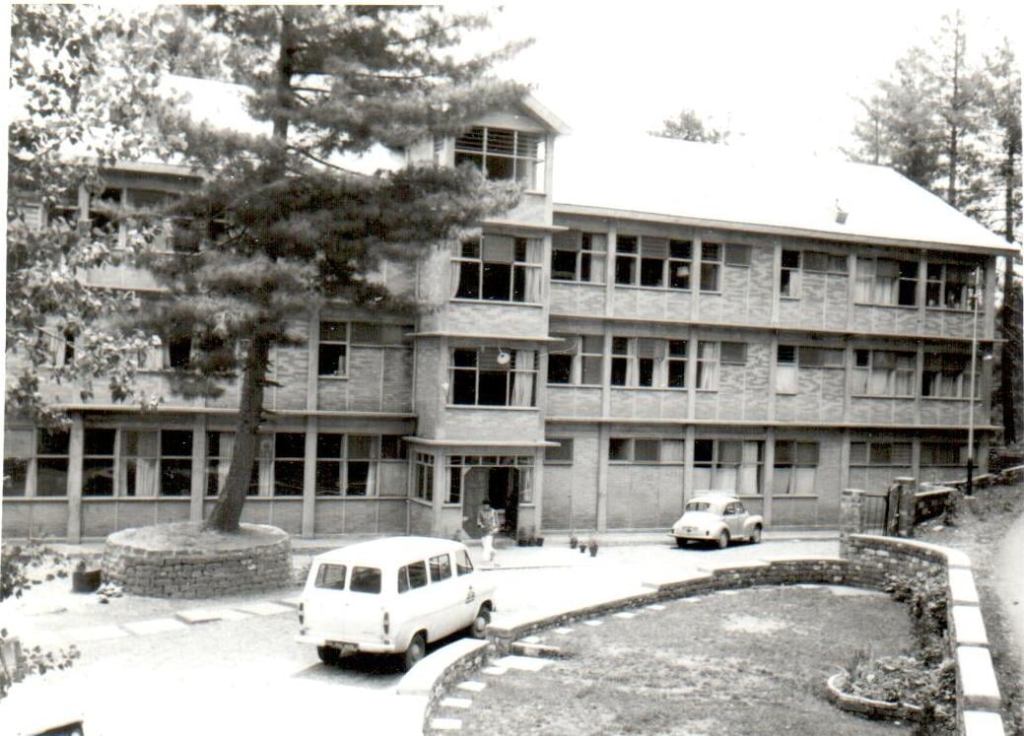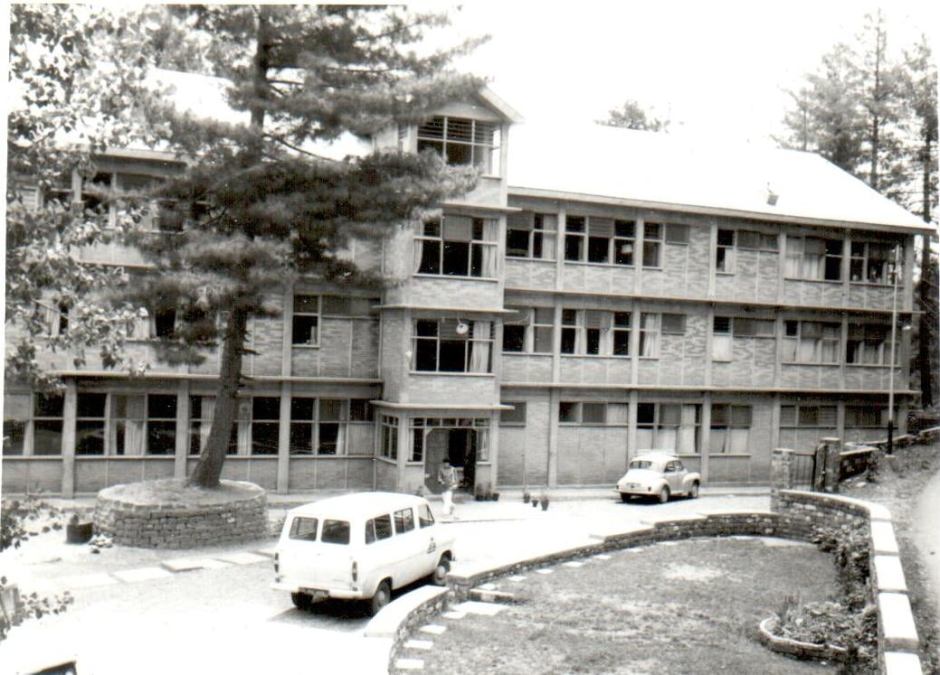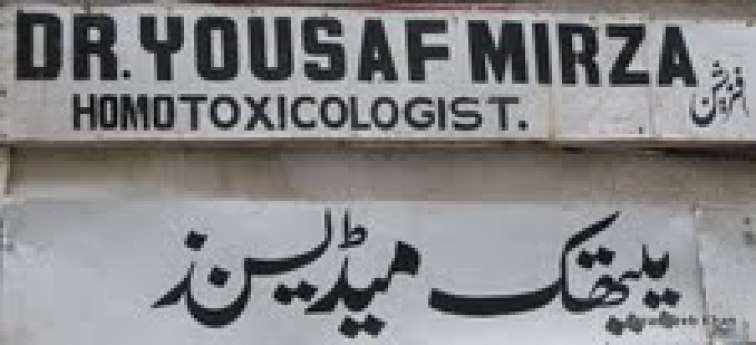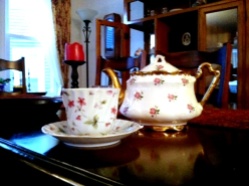
In June, the boarding school in Pakistan where I spent my childhood is closing its doors. No longer will children respond to the gong of a bell that goes off for meal times. No longer will high schoolers gather outside the hostel, shyly sitting with The Boy that one has liked for so long, hands brushing against each other through the conversation and laughter of their classmates. No longer will staff and students alike have to shout over the roar of monsoon rains on tin roofs. The pine trees will no longer hear the whispered joys, sorrows, and prayers of students. Steel bunkbeds will no longer capture early morning tears of homesickness. There will be no more chapel, no more tea time, no more study halls, and no more graduations. Never again will the school song, so long ago penned by my father, be sung in that setting.
An era will be over, and with it – part of my life will seem erased.
Last night with my younger daughter and husband I watched memories of Murree, put together by my dear friend Paul. I got to experience the thick fog of Jhika Gali, and the hairpin turns of roads. I heard one last gong of the bell and laughed as a monkey, captured perfectly on film, ran toward me and then away.
I have known about this closing for some time. The school was founded in 1956, a wonderful and admittedly rare happening where missionaries of every denomination got together and worked to build a school for the children of missionaries and nationals who were serving in Pakistan and neighboring countries. This year, after 65 years of service, the doors to the school will close. The last class will graduate. Murree Christian School will no longer be a concrete place with walls and windows, students and administrators. Instead it will be relegated to memories in people around the world and, surprisingly, a wikipedia page of its own.
My friend Robynn and I occassionally text back and forth about our school closing. Ten years apart, we had similar experiences at MCS. Times of sorrow and sadness to be sure – but that is not the only story. Our stories are stories of much laughter and learning, of grace and growth, of the pure joy of youth. About two months ago I texted to Robynn “Our childhood is slowly being erased.”
The closer the closing ceremony comes, the more I feel an urgent sadness that needs to be voiced. MCS holds so many stories. I somehow never thought that this day would really come. As my dear friend Robynn says so well:
Deep relationships were formed. Faith was nurtured. It’s difficult to capture in words what this hidden place has meant to many now literally scattered the world over.
Robynn Bliss
To be sure, we live in a different era. The school has dropped in size to a miniscule number. Staff are hard to come by and finances more so. Schools cannot stay open simply to be receptacles for childhood memories. In fact, the beauty of the times I visited back after graduation lay in the fact that it was still a living, vibrant place. New students and staff that (shockingly) did not know me had their own memories and events, their own life stories. A terrorist attack shortly after 9/11 changed the school in unimaginable ways, taking away the freedom that we students from the seventies had. Dwindling class sizes made it the more difficult to justify the cost of keeping up the buildings and grounds. Less people were comfortable sending their children to boarding school. There are many reasons to close and the decision to close was more difficult than I can imagine.
What does an adult do when they feel their childhood is slowly being erased? The tendency would be to grasp at whatever I can to keep the picture of what I had. Instead, I open my hands and I give the pencil back to God. From the beginning it is he that wrote the story of MCS. It is God who gave the vision, God who sustained the decades of life, God who loves the people who entered and left the large, stone building to forge their way in a world beyond.
As I have thought more about MCS closing, I have released the idea of my childhood erased. That is giving the closing of a man-made, though wonderful, institution too much power. Instead I’ve thought about the stones of remembrance that I take with me from my childhood and this place that shaped me.
The idea of stones of remembrance comes from the Old Testament book of Joshua. The Lord tells Joshua to choose 12 men, one from each tribe. They are to go and pick up a stone from the middle of the Jordan River, at the spot where the priests were carrying the Ark of the Covenant. They were to carry the stones to the place where the people would spend the night. There they would put them down to serve as a sign. These were stones of remembrance. They served as a sign to the people present and to future generations that God was there, that he was faithful, that he did not leave his people.
What are the stones of remembrance in my life that connect to MCS? What rocks can I point to, stones of surety that declare “God was here.” What can I list that point to a life of faith, built on a stone foundation?
My stones of remembrance are imperfect people who taught me how to forgive and fellow students and dear friends who taught me what it was to press on. My stones of remembrance are the laughter that drowns out the memories of homesickness and the growth that leans into discomfort. My stones of remembrance are brothers who share blood and friends who share memories. My stones of remembrance are rocks of trust and knowing that somehow, all would be well.
I am gathering the stones, I am putting them down in writing, so that I too can tell future generations “This is what shaped me, this is why I am here.” Because it’s good to remember.
At every graduation and important event, we sang our school hymn, voices raised to the rafters of the old church building turned school. Some of us sang with immense talent, others just sang. Though all were lost in those moments in their own thoughts, never knowing that most would look back on these times and the song itself with deep longing. I leave you the final verse here – a reminder that no closing of anything is powerful enough to erase childhood.
Lord with thanks and praise we honor Murree Christian School May her life and fame and service for thee ever rule Built upon a firm foundation, in God's hands a tool, Shaping lives of dedication, Murree Christian School
Fellow MCSers, what are your stones of remembrance?






















